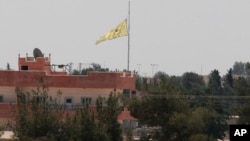Throughout the general election campaign, Turkey’s opposition parties were united in their criticism of the AK Party policy of supporting Syrian rebels seeking to defeat President Bashar al-Assad's regime.
The loss of the AK Party's parliamentary majority in the election held earlier this month cast a shadow over support for the rebels.
Among the opposition's key calls was the sealing of Turkey’s 900-kilometer border with Syria.
The AK Party has been repeatedly accused by its opponents in Turkey and some of its international allies of failing to prevent jihadist groups fighting in Syria from receiving support through Turkey.
With the June 7 general election failing to produce an outright winner, the country is in the midst of coalition building.
Secure border
Whatever the outcome, diplomatic columnist Semih Idiz of Turkey’s Cumhurriyet newspaper and Al Monitor website, said the new government will insist on a more secure border, which will have consequences for jihadist groups operating in Syria.
"The opposition parties have been very against the way the AKP government has approached this issue," Idiz said.
"There has been lot of logistical advantage, that these extremist groups can enjoy from the very long and partly porous border, where they can come and cross again, where they come to hospitals in Turkey, and do their recreational events or recruitment events. It will be a strategic loss if they lose this advantage," he added.
The former AKP government had recently increased its cooperation with Qatar and Saudi Arabia in coordinating efforts with Islamist groups fighting the Assad regime.
Observers said that cooperation is likely to fall victim to the new Turkish government.
Diplomacy over military
Diplomatic columnist Idiz predicts the new coalition is likely to focus more on diplomacy than military means to end the Syrian civil war, a move he said could bring it closer to Western allies.
"Negotiations possibly with the Assad regime, if not with Assad himself. A transition period whereby elements of the Baath regime remain standing," he said.
"You have to recall ISIS has changed the equation for Turkey’s Western partners. Many of them are not keen to see a vacuum in Damascus, which [could be] filled in with groups like ISIS," Idiz said, using an acronym for the Islamic State group.
Observers said a policy shift is likely to find supporters within the ranks of the AKP.
But the growing power of Syrian Kurdish political forces, the PYD, concerns the AKP and Turkish nationalists with fears it could incite Turkey’s own restive Kurdish minority.
In the past few months, backed by U.S.-led coalition airstrikes, the PYD's military arm, the YPG, has scored a series of victories against Islamic State militants.
Last week, President Recep Tayyip Erdogan slammed the West for its support of the Kurds.
Erdogan said the West's planes have hit and bombed Arabs and Turkmen, and the West is unfortunately only supporting the "terrorists" groups of PYD and Turkish Kurdish group the PKK.
Terrorist ties
Analysts said the PYD's alleged links to the PKK, which is designated a terrorist organization by Washington and the European Union, has held back military cooperation with Western coalition forces.
But the intense air support provided by coalition forces for the PYD's forces in recent months and this week in particular, with its capture of Tel Abyad from Islamic State forces, marks a turning a point, according to political scientist Cengiz Aktar of Istanbul’s Suleyman Sah University.
"Tel Abyad is a vanguard move by the coalition forces, Kurds plus the West, in order to make a serious push towards Raqqa, which is the capital of ISIL," Aktar said, using an acronym for the Islamic State group.
Tel Abyad was of strategic importance to the Islamic State group, being the last direct supply route between Turkey and Raqqa.
The capture of the town also gives Syrian Kurdish forces control of the main road to Raqqa, only 80 kilometers away (48 miles).
Observers said the growing legitimacy of the Syrian Kurdish fighters in the eyes of Western coalition forces is likely to give Turkey’s opposition parties further ammunition in their argument the country’s Syrian policy has failed and needs to change.




